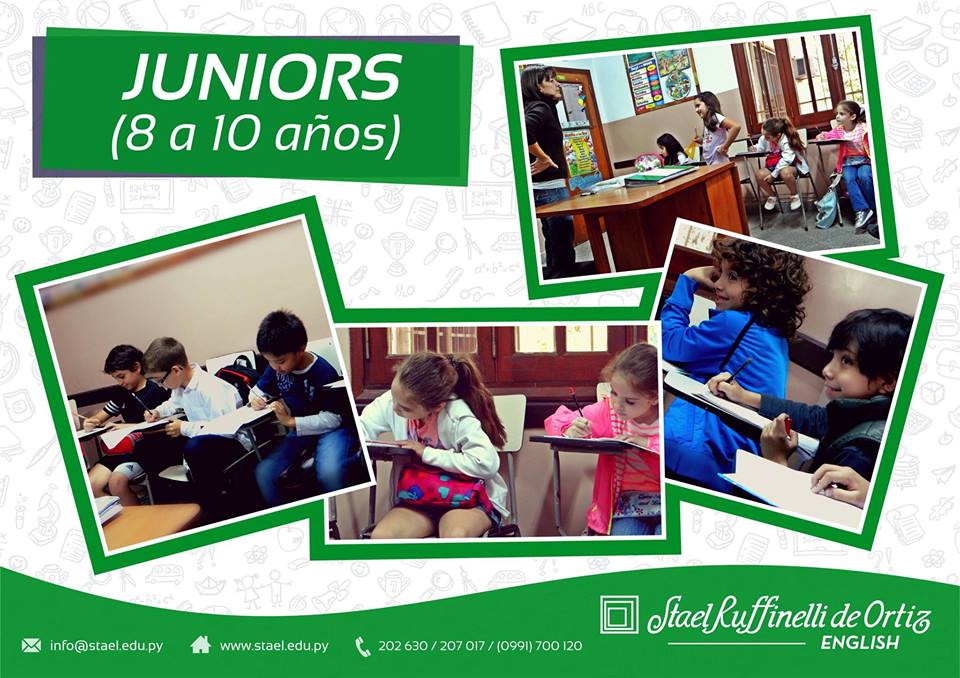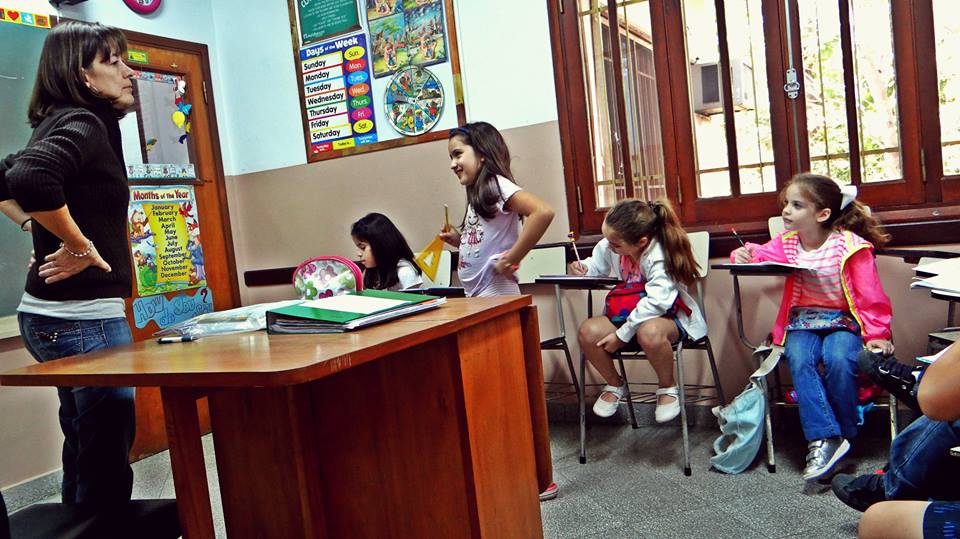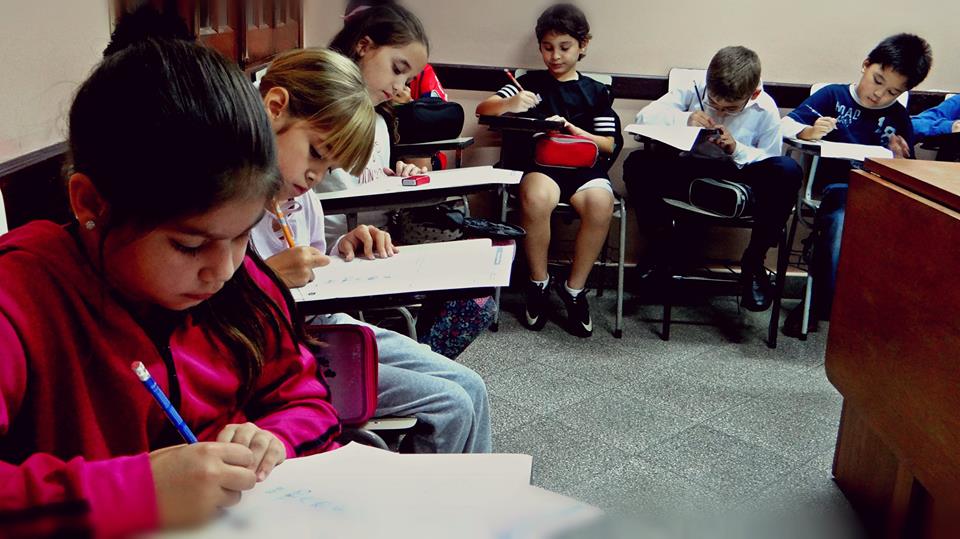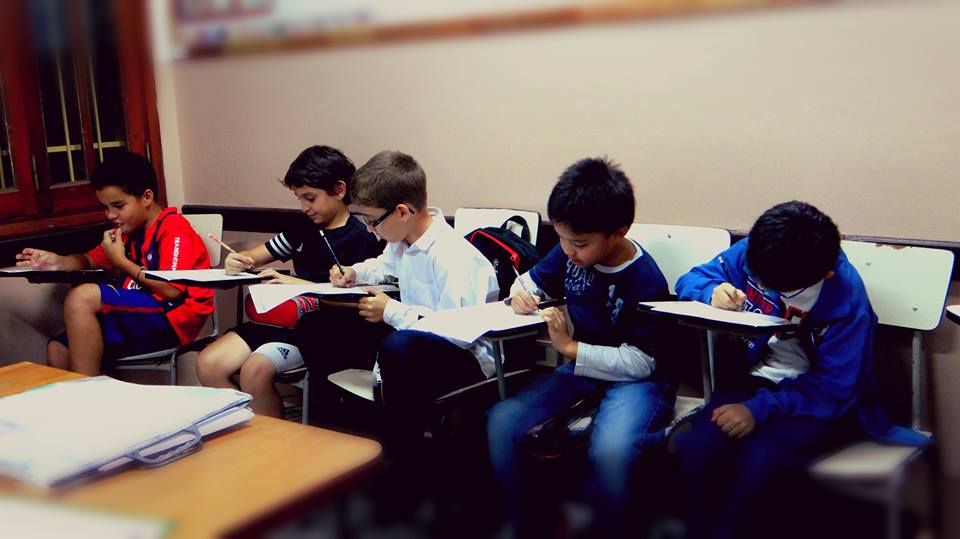Special Courses
Stael Ruffinelli de Ortiz offers special courses: Legal English: Aimed to lawyers, law students and notary. Requirements: Placement...
Read moreInternational Speakers
Read more
Work with us
Please complete the form. click here!
Read morePlacement Test
The placement is aimed at people who have already studied English. We have 2 classifications for all ages: Beginners and intermediate. The Beginners test...
Read more Read moreOnline classes
Edusoft Platform Online classes are designed with a pedagogical platform that will allow you to develop different modules, in a very easy and fast...
Read moreJuniors
Children can start a Junior course when they are 9 years old, as long as they turn 10 during the school year.
They will stay in the Junior course until they are 15 years old, when they move on to Adolescent courses. Each module lasts for 60 hours (5 months).
Here at the Institute we have an all-encompassing answer to this question because we not only expect a student to speak English, but to think in English as well. Students learn English by practicing the four basic skills in an integrated way. Each module is divided in two parts of 30 hours of instruction each.
Students are continuously evaluated through assessment, diagnostic, formative and summative tests.
Each module has two exams which are given upon completing 30 hours of instruction.
The student’s learning process represents 40% of the total grade, and the results of oral and written tests make up 60% of the total grade. Evaluation sheets are sent out to parents at the end of each period.
From the very beginning students use a textbook, workbook, cassettes, reading books, computers, and the library to develop their interest in reading. The institute also offers a wide array of instructional materials which teachers use as they deem appropriate for their classes.
Starting in Junior 2, students use reading books in class. Our program is based on literature because through reading students have the opportunity to interact in class using English while developing their critical and creative thinking. Through reading, students get to know themselves better, to express their opinions, to ask questions and to think critically.
Our students are prepared to successfully pass the Trinity Oral Examination, an oral exam that provides an international certification. By setting international standards, the Institute raises the expectation level and sets out to give students an education that will allow them to act effectively in a highly competitive environment.

The Institute offers the following Junior modules:
Junior 1A - Jr 1B
After 120 hours of instruction, students will be able to:
-
Hold a simple conversation about topics such as training and hobbies
-
Send e-mails in English to their friends. Chat with their friends about their hobbies, activities, music, and movies
-
Request and give information in English, using simple vocabulary and structures
-
Describe verbally and in written form the characters in a story, famous artists, family members, and acquaintances
-
Students will be able to give information about a person’s physical characteristics, personality, and likes
Junior 2- Jr 3
Upon completing Junior 3, students will be able to:
- Talk about different topics
- Hold a simple conversation over the telephone
- Write informal letters, articles, descriptions, and dialogues
- Read stories and novels analyzing characters, making predictions, and doing several activities which contribute to the development of creative thinking
- Keep a journal where they write down their experiences using simple language
- Understand movie segments and describe scenes and characters
- Give and follow instructions using simple sentences
Junior 4A, Fist Part– Jr 4A, Second Part.
Upon completing Junior 4A, students will be able to:
- Talk about trips, hobbies, movies and books
- Read stories and novels analyzing characters, making predictions, writing summaries, literary critiques, expressing their opinion, and doing several activities which contribute to the development of creative and critical thinking
- See movies and describe and discuss them
- Write formal and informal letters
- Write formal and informal letters
- Understand movie segments and describe scenes and characters
Junior 5A - 5B.
Upon completing Junior 5B, students will be able to:
- Talk fluently about articles, stories and readings
- Read stories and novels doing oral and written activities which contribute to the development of creative and critical thinking
- Watch movies and be able to describe and talk about them
- Write formal and informal letters
- Use the internet to access information
- Keep a journal where they write about their feelings and experiences
- Understand and analyze songs
- Write their own stoies
- Give oral presentations using the equipment provided by the Institute: overhead projector, PowerPoint, In Focus, and others
- Do independent reading at the Charles Dickens Library


Junior 6A - 6B.
Upon completing Junior 4A, students will be able to:
- Talk fluently about articles, stories and readings
- Do independent reading and understand the meaning of new words through context
- Use more complex grammatical structures, such as passive voice and indirect speech
- Give oral presentations using the equipment provided by the Institute: overhead projector, PowerPoint, In Focus, and others
- Read stories and novels doing oral and written activities which contribute to the development of creative and critical thinking
- Watch movies and be able to describe and discuss them
- Write formal and informal letters
- Keep a journal where they write about their feelings and experiences
- Understand and analyze songs
- Write their own stories
- Use the internet to access information







